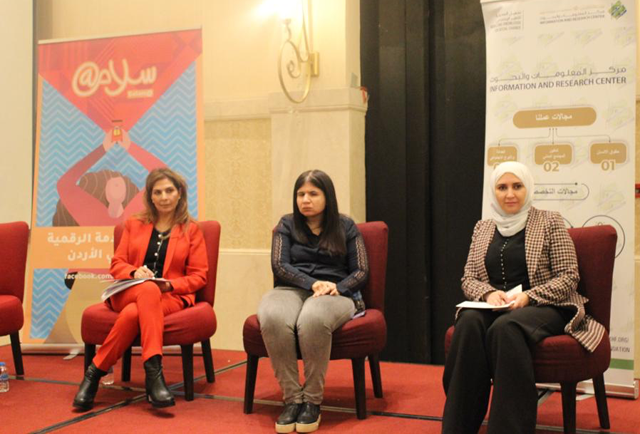You are here
First Salam@ conference in Jordan talks women’s online safety, security
By Maria Weldali - Sep 14,2022 - Last updated at Sep 14,2022

Minister of State for Legal Affairs Wafa Bani Mustafa during a high level meeting which was convened prior to the launch of Salam@ regional conference on Wednesday (Petra photo)
AMMAN — In the virtual world, a large and expanding platform, women are at higher risk of digital violence, said Minister of State for Legal Affairs Wafa Bani Mustafa on Wednesday.
The minister, speaking during a high level meeting which was convened prior to the launch of Salam@ regional conference on Wednesday, highlighted that “the digital dimensions of online gender-based harassment have a socio-psychological impact on society”.
Salam@ for women and youth in the MENA region, a multi-year programme implemented by the Canadian think tank SecDev, seeks to change perceptions and behaviours as well as increase awareness of digital safety.
The programme focuses on capacity building of youth, civil society organisations that ends online violence against women, through promoting safer online experiences.
In Jordan, the Public Security Directorate (PSD) established the cybercrime division in 2008, which later came to be known as the Cybercrime Unit, according to Bani Mustafa, adding that Jordan has an integrated legal system that supports digital security.
Moreover, the minister indicated that personal data protection draft law has been submitted to parliament, and was transferred to the special contact committee.
In his opening remarks, Salam@ MENA Senior Regional Manager Raed Sharif, said: “Salam@ aims to create a healthy and safe digital community, with the focus on women.”
Sharif noted that the programme aims to tackle the problem of digital violence, taking into consideration the needs of each country.
“Despite the awareness of many, digital violence is still looked at as a technical problem, rather than as a community issue,” Sharif said.
He pointed out that the digital surge during the pandemic has showed the magnitude of people’s connection to technology, which eventually led to an increase of gender violence in the digital space.
“Emphasis should be placed on the legal aspects [which help a victim of digital violence] as well as on the psychosocial outcomes of digital violence,” he added.
On the sidelines of the high level meeting, Salam@ national coordinator Lina Momani, told The Jordan Times that “Salam@ regional conference comes after three years of the project’s presence in the MENA region”.
She added that various topics relating to digital violence would be discussed during the four-day long conference that will take place in Amman and the Dead Sea.
The strategic meeting also saw the presentation of the findings of a study titled “Psychosocial Impacts of Digital Violence against Women and Girls in Jordan”, which showed that divorced women are the most at risk of digital violence and harassment, at 53.1 per cent of the 525 women surveyed.
The study also revealed that 28 per cent of surveyed women said that they experienced digital violence, 59 per cent denied any exposure to online harassment, while 9 per cent said that they might have been exposed to digital abused.
The remaining 4 per cent preferred not to respond.
In 2021, the PSD Cybercrime Unit dealt with 13,000 cybercrimes, compared with 10,000 in 2020 and around 9,000 in 2019, according to Salam@.
Ayman Halaseh, director of the Information and Research Centre – King Hussein Foundation (IRCKHF) noted during his keynote speech the importance of raising digital awareness and developing technical assets that create safe online spaces for all.
“Everyone can be a victim of digital violence however women are at greatest risk,” he said.
Halaseh mentioned the various initiatives that have been developed by Salam@ Jordan in partnership with IRCKHF, which he described as “initiatives that have different modes of application but achieve a common objective [digital safety]”, he said.
On day one, two podium discussions featured relevant local and Arab experts which discussed Salam@ programme experiences throughout the years.
Related Articles
AMMAN — Self-blame for digital gender-based violence perpetuates the culture of silence in Jordan, according to a recent Salam@ survey.Salam
AMMAN — Involving a network of local activists and media representatives, Salam@ in cooperation with the Information and Research Centre-Kin
AMMAN — The Salam@ programme for digital safety, in partnership with the Information and Research Centre of the King Hussein Foundation (IRC
















